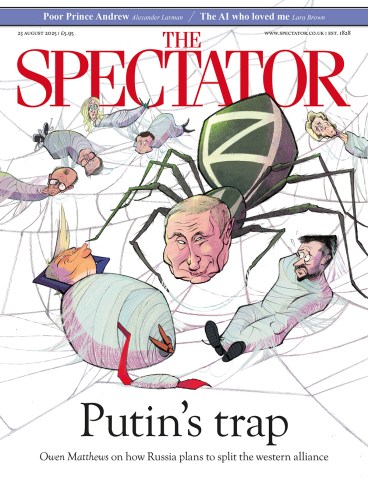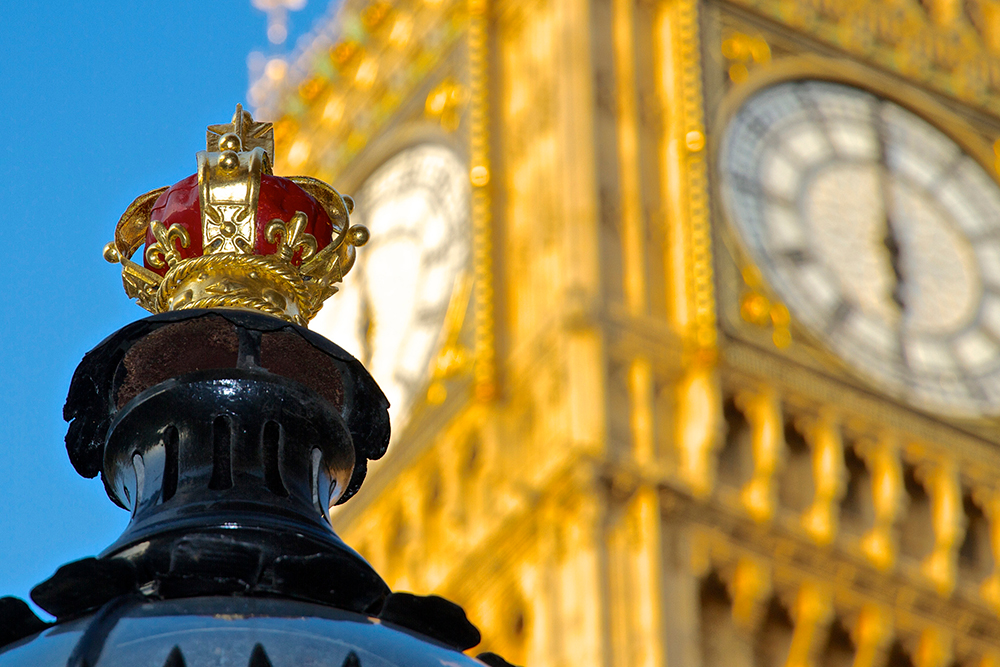
A currently fashionable conservatism is militantly against Ukraine and, by more cautious implication, pro-Russia. We who disagree are, I quote Matthew Parris in these pages last week, ‘prey to the illusion that the second world war was a template for future conflict, and Hitler a template for Putin’. Others put it more unkindly, speaking of ‘Ukraine brain’ as a mental affliction among the Cold War generations. One should not project the entire second world war on to now, but some similarities with the 1930s are undeniable. Dictator exploits resentment at what he says is an unequal treaty after defeat; claims land in various places as the true property of his people; occupies some of it, changing borders by the threat of force, later by direct force; keeps demanding more; keeps threatening. The European democracies mostly dislike what is happening, but understandably wish to appease. As it all gets nastier, some incline to criticise the behaviour of the victim nations and their leaders (Benes then; Zelensky now) and downplay the sins of the aggressor. Matthew, for example, wants Zelensky to ‘get off his high horse’ without noticing that Putin’s horse is much, much higher. The United States wants as little to do with it as possible. Dictator has a much firmer purpose than his democratic opponents, so he wins. At first, only the direct victim suffers. Later, all of us do. This argument is not exact, but it is not idiotic either.
Elsewhere in this week’s issue, Ursula Buchan writes about her grandfather John Buchan’s time at The Spectator, the grounding for his career in political life and as a celebrated novelist. His very first article for the paper (20 January 1900) was called ‘The Russian Imperial Ideal’. Buchan identified ‘the two parties in the [Tsarist] government… both vigorous, one demanding internal reform, the other seeking external empire. At present she seems to have chosen for the latter, but… an Empire and commercial supremacy can only be built upon a genuine and healthy national life, and Russia, while she has the materials for such a life, has hitherto neglected to use them. Militarism and economic reform, where the former is so triumphant and the latter so urgent, are the lion and the lamb which will never lie down together.’ They never did, though Gorbachev tried. The lion ate the lamb long ago.
Tom Gordon, a Liberal Democrat MP, is leading a campaign to recruit more working-class people for parliament. He praises the few ‘salt of the earth guys who are making it all happen’ in his part of England (Harrogate and Knaresborough: not, it must be said, a super-working-class area). Mr Gordon does not confront the problem that nowadays the working class has been almost abolished, partly by the largely good trend of upward mobility and partly by the largely bad one of a welfare system which pays the poorly educated not to work. Looking at the 2024 intake of MPs, I would say that by far the greater problem is that so many, whatever their family roots, came into politics through politics/activism/politicised charity work, and know about nothing else. Looking at the question in class terms, I would say the more noticeable absence is members of the upper class. Nearly 40 years ago, I commissioned a scholarly piece (The Spectator, 3 May 1986) by the late Hugh Montgomery-Massingberd called ‘The Descent of Tory Man’. It analysed the social class of all Conservative MPs at that Thatcher high tide and found 19 (including William Waldegrave, Nicholas Ridley, Lord Cranborne and Nicholas Soames) in the top social class, 33 in the second highest, 86 in the third, and the majority (there were 392 Tories at that time) in classes four to ten. Trying to apply that analysis to the present 121 Conservatives, I can think of only one – the wise and public-spirited Jesse Norman – who could be described as upper-class, and even he might have reached only class 2 according to Massingberd’s exacting criteria. What applies to the Tories applies, a fortiori, to all MPs. So when parliament is more despised than at any time since the Great Reform Bill, it is also the least aristocratic it has ever been. Are these two phenomena related?
I wish all the argument about pronouns had been raging when I was a teenager. That was the time when it first became commonplace to address God as ‘You’ in the liturgy and in translations of the Bible. I was against the change then because it sacrificed beauty, but I could never quite answer those who said it was better to speak to God less formally and more intimately. In my then ignorance, I did not know that ‘Thou’, as is the case with the second person singular in many other languages, was historically the more intimate and loving form, and so I did not understand that the plural ‘You’ was the more distant one. The use of ‘You’ is also theologically inaccurate, since it grammatically implies that there is more than one God. The Trinity, after all, are not some things. It is one thing.
Recently, I booked a hotel room in the north of England. We could have ‘de luxe’ or ‘superior’. It was explained to me that superior, in this context, meant inferior: de luxe had been recently ‘refreshed’; superior had not. We were inclined to take ‘de luxe’, but then I asked whether de luxe had baths. No, it had only walk-in showers. Superior, however, had baths. So we took superior, thereby saving more than £100. This must be the first generation in human history which has paid less for a room with a bath than for one without. Why the change? I can think of four possible reasons: 1) Americans prefer showers. 2) Showers save water, and therefore the planet. 3) Showers save space, and therefore property cost. 4) Many customers are too old or fat to get out of baths. In another generation, will baths be objects only of historical interest, like mangles?








Comments